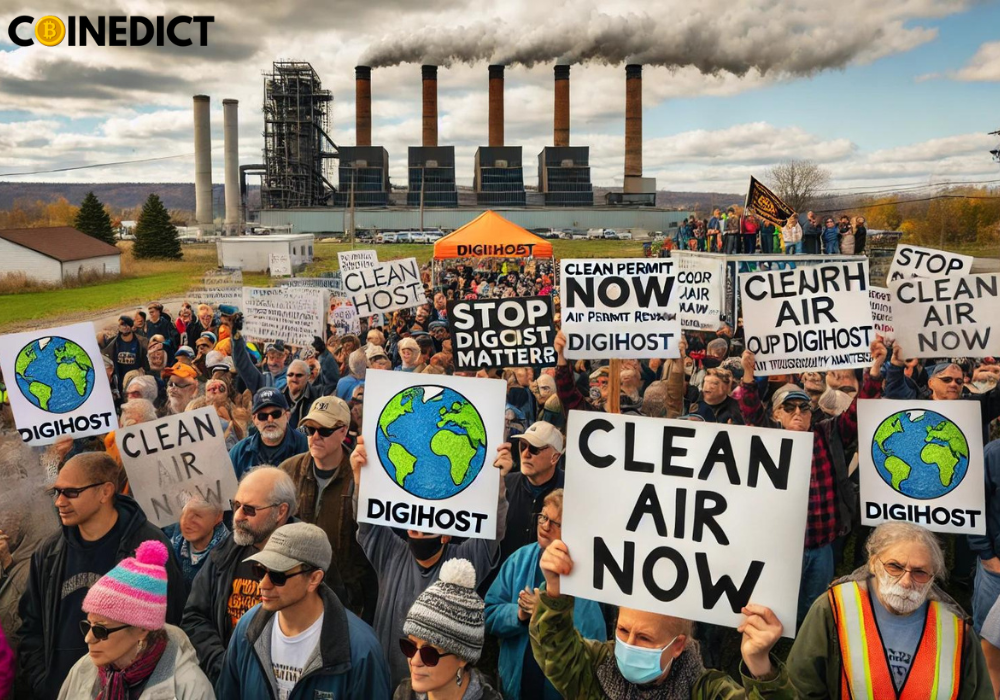In a bustling corner of New York State, the community of North Tonawanda is making their voices heard, rallying against the renewal of an air permit for Digihost, a cryptocurrency mining company. The plant in question, once a crucial peaker plant aiding New York’s electrical grid during peak demand periods, has now shifted gears to focus on the energy-intensive task of mining digital currencies. This change has sparked concern and opposition from local advocates who are urging the New York Department of Environmental Conservation (DEC) to reject the company’s permit renewal application.
The Shift from Peaker Plant to Crypto Mining
The facility, located in North Tonawanda, was originally designed to kick into action during times of high electricity demand, ensuring stability and reliability for the state’s electrical grid. Peaker plants like this one are vital assets, operating only during peak usage times to prevent blackouts and maintain a steady supply of electricity. However, as the energy landscape evolves, so too have the uses for such facilities.
Digihost saw an opportunity in this changing landscape and repurposed the plant for cryptocurrency mining, a process notorious for its massive energy consumption. Mining digital currencies like Bitcoin involves solving complex mathematical problems, which requires significant computational power and, consequently, a substantial amount of electricity.
Community Concerns and Environmental Impact
The switch from a peaker plant to a cryptocurrency mining operation has not sat well with the residents of North Tonawanda. Advocates argue that the environmental footprint of cryptocurrency mining is far greater than that of a peaker plant’s sporadic operation. The increase in continuous power usage raises concerns about higher emissions and the overall impact on air quality in the region.
Local environmental groups and concerned citizens are highlighting the potential risks associated with Digihost’s operations. They emphasize that the increased energy consumption not only poses a threat to local air quality but also contributes to broader climate change issues. The community’s rallying cry is centered around protecting the environment and ensuring that corporate interests do not outweigh the health and well-being of local residents.
Calls for the DEC to Act
Advocates are urging the New York DEC to take a stand and reject Digihost’s air permit renewal application. They argue that granting the renewal would set a dangerous precedent, potentially opening the door for more energy-hungry cryptocurrency mining operations to take root in the state, further exacerbating environmental concerns.
The push against Digihost’s permit renewal is gaining momentum, with residents organizing petitions, public meetings, and demonstrations to voice their opposition. The community’s efforts are a testament to the power of grassroots activism and the collective determination to safeguard their environment.
The Broader Implications
The outcome of this battle in North Tonawanda could have far-reaching implications for how cryptocurrency mining operations are regulated in the future. As digital currencies continue to gain popularity, the need for a balanced approach that considers both technological advancement and environmental stewardship becomes increasingly important.
The North Tonawanda community’s stand against Digihost highlights the growing tension between the rapid expansion of digital industries and the need to protect our planet. It serves as a reminder that while innovation drives progress, it must be pursued responsibly and sustainably.
Conclusion
As the New York DEC deliberates on Digihost’s air permit renewal, the voices of North Tonawanda residents echo a broader call for environmental accountability. The decision will not only impact the local community but could also set a precedent for how such cases are handled in the future. The advocates’ message is clear: protecting the environment and public health must take precedence over corporate interests, ensuring a sustainable future for generations to come.











